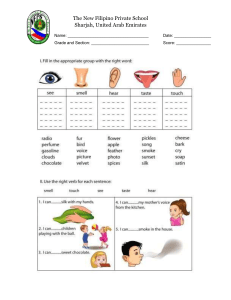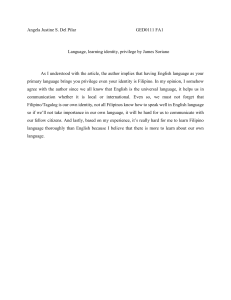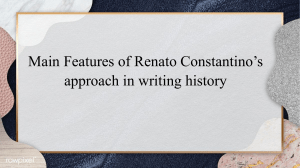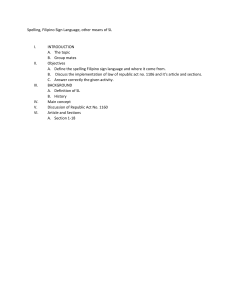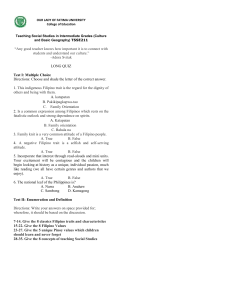Political Self: Filipino Identity & Democratic Development
advertisement
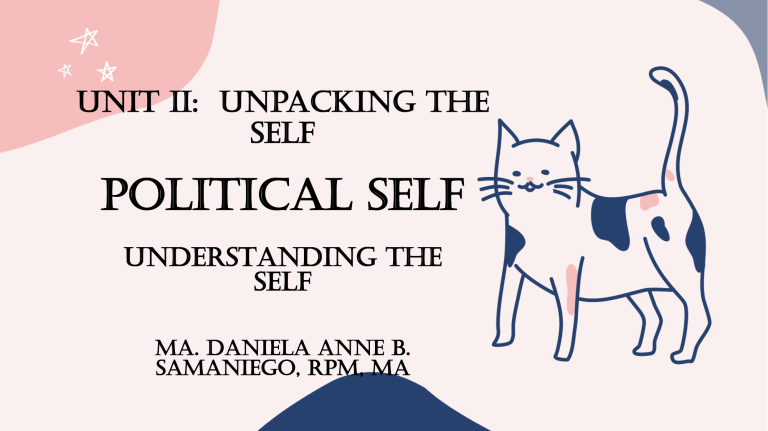
Unit II: Unpacking the Self POLITICAL SELF UNDERSTANDING THE SELF MA. DANIELA ANNE B. SAMANIEGO, RPm, MA What is Politics? Greek word ‘Politika’ – “affairs of the cities” Set of activities that are associated with making decisions in groups, or other forms of power relations between individuals, such as the distribution of resources or status. What is Political self? Explores how our social and economic contexts affect our mental health and well-being. It can be inferred that a person’s ability to influence others by making a decision for them is one of the essential qualities in one’s political self. HOW CAN PEOPLE BE INFLUENCED BY OTHERS? 2 Types of Social Influence: NORMATIVE INFLUENCE – based on conforming to the positive expectations of others. INFORMATIONAL INFLUENCE – based on accepting the information from others as evidence of reality. leadership Process by which certain group members motivate and guide the group. Need for Power - desire to Theories of leadership David mcclelland’s motivational theory hold control and authority over another person and influence their decision in accordance with his own needs or desires Need for Affiliation - urge to have interpersonal and social relationships with others. Need for Achievement urge to achieve something in what you do. Developing a Filipino Identity: Values, Traits, Community and Institutional Factors Collective action, shared vision, means of sustainable future and the link to generation has been crucial in the construction of identity and sense of belonging in the democratic standpoint. Thus, enhancing the practice of citizenship and democracy is crucial to the awareness and understanding of self and community. Three Major Concerns in Building an Identity: 1. Instrumental - An individual act in accordance with rules and identities consistent with supportive democratic processes. 3. Transformative - 2. Morals - Values and Includes process of selfreflection and redefinition of individuals, institutions and communities. beliefs embody and reinforce democratic principles. Aspects in developing filipino identity: Individual Attitudes and Traits Institutional Factors Macro-Factors at the Societal Level Aspects in developing filipino identity: INDIVIDUAL ATTITUDES & TRAITS Rethinking Filipino Values (Filipino Psychology): Colonial / Accommodative Surface Values • Hiya (propriety / dignity) • Utang na loob (debt of gratitude or solidarity) • Pakikisama (smooth interpersonal relationships) Confrontative Surface Values • Bahala na (determination & risktaking) • Sama / Lakas ng loob (resentment / guts) • Pakikibaka (resistance) Societal Values • Karangalan (dignity) • Puri • Dangal • Katarungan (justice) • Kalayaan (freedom) Aspects in developing filipino identity: INDIVIDUAL ATTITUDES & TRAITS Rethinking Filipino Values (Filipino Psychology): Pivotal Interpersonal Value •Pakikiramdam (shared inner perception) Linking SocioPersonal Value •Kagandahangloob (shared humanity) Aspects in developing filipino identity: institutional factors Institutional Factors • Family • Church • School • Media • Government • Non-government • People's organization Aspects in developing filipino identity: macro-factors Macro – Factors at the Societal Level • Immediate community with which one readily identifies one's self • Less intimate grouping of which one is a member March and Olsen’s Framework of Democratic Political Development • Building institutions that civilize expressions of solidarity and confrontation of conflict among identities. • Forming specific identities that fit into and support a democratic political order. • Sense of solidarity that connects the individual to a broad political community of others and organizes other belongings in a way that enriches the community. Przeworski’s Concept of Effective Citizenship • Official conduct in accordance with the law. • A judicial system applied equally to all. • Social conditions for the exercise of citizen's rights. thank you!
